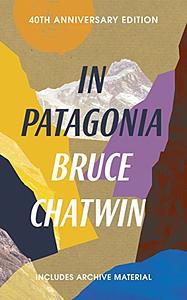You need to sign in or sign up before continuing.
Take a photo of a barcode or cover
Interesting stories from a fascinating part of the world.
Reread it after all of these years. Great story telling, but I now see the descriptive prose tends to be on the purple side.
adventurous
informative
reflective
slow-paced
Super slow at times and lowkey could’ve worded things so much more interestingly. I loved the bits where it became stories within storied and mini biographies but unfortunately they became more and more few and far between
Not a huge fan of this one. It dragged, was kind of confusing, and only focused on white people who lived in Patagonia. I would have loved to have read more about people native to the area.
This book’s title is a tad misleading, as it is less about the fascinating land of Patagonia, and more an idiosyncratic history of selected events that transpired there, and the personalities involved. The author’s main focus is on northern European settlers: primarily Welsh, German, English — and almost nothing about the Spanish.
The author’s prose are great but his language is dated, referring—rather dismissively I think—to (mostly Spanish-speaking) laborers as “peons,” which I found off-putting. He is a bit less dismissive about the (mis)treatment of native peoples by the colonizers and national governments (also pointing out Charles Darwin’s unabashed contempt for the native inhabitants of Tierra del Fuego chronicled in “Voyage of the Beagle”).
If you are interested in learning about Patagonia history and some of the interesting (European) inhabitants, this is a decent read, albeit kind of anachronistic. But as a description of the land itself, I found it lacking. I think a more informative title for the book would be, “A Eurocentric Chronicle of My Travels Through Patagonia.”
The author’s prose are great but his language is dated, referring—rather dismissively I think—to (mostly Spanish-speaking) laborers as “peons,” which I found off-putting. He is a bit less dismissive about the (mis)treatment of native peoples by the colonizers and national governments (also pointing out Charles Darwin’s unabashed contempt for the native inhabitants of Tierra del Fuego chronicled in “Voyage of the Beagle”).
If you are interested in learning about Patagonia history and some of the interesting (European) inhabitants, this is a decent read, albeit kind of anachronistic. But as a description of the land itself, I found it lacking. I think a more informative title for the book would be, “A Eurocentric Chronicle of My Travels Through Patagonia.”
Perfect read for windy nights hunkered down in my tent in the wilds of southern Patagonia.
2.5 disappointed… just really didn’t hold my attention. was more just about pirates and cowboys than anything. couldn’t really follow any of the characters either… didn’t know who or what he was on about
not irredeemable though i did still appreciate what he was getting at but just nowhere as good as songlines.
not irredeemable though i did still appreciate what he was getting at but just nowhere as good as songlines.
For me, this is arguably the most beautiful book ever written. I’ve read it a dozen times and feel like I still don’t quite “get it”. Chatwin is the unsurpassed stylist of travel writing. His sentences are tight and beautifully composed, poetic in nature. Published in 1977, the book chronicles (kind of) Chatwin’s romp through Patagonia. He steps out of the typical academic conventions of travel literature and while is eye for historical detail (not to the captivating way it is related) is astounding you often wonder…is this for real? The journey seems captivated by the ether. This is a book that transcends “plot” and touches on the real essence of travel.
Prior to my reading this, if you had asked me what is Patagonia?, I probably would have said, "That company that makes backpacks and outdoor crap."
Within the first 30 to 40 pages, if you had asked me again, I would have said it was practically the end of the world, an exotic, magnetic, land, filled with strange characters and harsh, extreme, beautiful landscapes.
Having finished the book, it feels like Chatwin somehow drained the life out of the place and obliterated its magic. He left me a monotone landscape dotted by odd dwellings spaced far apart filled almost entirely by European emigrants either formerly rich, bored, restless, or mentally declining. Infrequently, the dying embers of my hopes for this book were almost rekindled by an historical anecdote, a local myth, or a name I'd not expected (say, Darwin, or Butch Cassidy), but most felt rushed, devoid of context, or enervated. Chatwin, himself, seems like a fascinating character and yet he even renders himself a tedious player in this adventure.
I forced myself through this--that's on me. But the writing--an ADHD's travelogue--that's on Chatwin.
Within the first 30 to 40 pages, if you had asked me again, I would have said it was practically the end of the world, an exotic, magnetic, land, filled with strange characters and harsh, extreme, beautiful landscapes.
Having finished the book, it feels like Chatwin somehow drained the life out of the place and obliterated its magic. He left me a monotone landscape dotted by odd dwellings spaced far apart filled almost entirely by European emigrants either formerly rich, bored, restless, or mentally declining. Infrequently, the dying embers of my hopes for this book were almost rekindled by an historical anecdote, a local myth, or a name I'd not expected (say, Darwin, or Butch Cassidy), but most felt rushed, devoid of context, or enervated. Chatwin, himself, seems like a fascinating character and yet he even renders himself a tedious player in this adventure.
I forced myself through this--that's on me. But the writing--an ADHD's travelogue--that's on Chatwin.
The book that spawned another billion wannabe travel writers. Chatwin's is still the best and the most authentic despite coming under criticism in more recent years due to the nature of some of the tales.





